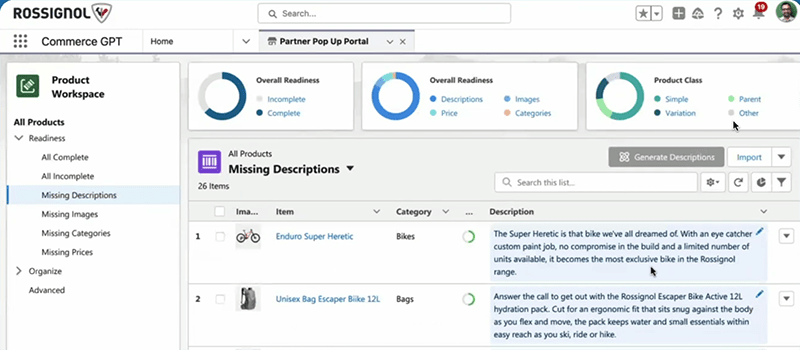Home >Technology peripherals >AI >Forefront | CRM giant Salesforce launches new AI products, focusing on marketing and business scenarios
Forefront | CRM giant Salesforce launches new AI products, focusing on marketing and business scenarios
- WBOYWBOYWBOYWBOYWBOYWBOYWBOYWBOYWBOYWBOYWBOYWBOYWBforward
- 2023-06-09 23:20:461210browse
文 | Zhang Yichi
Editor | Deng Yongyi
On June 7, US time, Salesforce launched two new generative AI products, namely Marketing GPT and Commerce GPT, which provide practitioners with a series of AI tools to provide customers with personalized marketing services and personalized experiences.
Salesforce, the world's largest CRM company, is currently making every effort to promote the application of AI. In May of this year, Salesforce's corporate communication tool Slack and business intelligence analysis tool Tableau respectively launched corresponding GPT products. In June, Salesforce announced the expansion of its strategic partnership with Google Cloud to enhance AI, data and CRM capabilities.
However, the two new products released this time have not been fully launched. According to Salesforce, most functions in Marketing GPT and Commerce GPT will be piloted in October 2023 and fully launched in February 2024.
The wave of AI large models is sweeping the world, and the revolution in software has begun. According to a report released by Sortlist Data Hub, marketing and public relations departments are most affected by AI, with 43% of companies hoping to use ChatGPT to write marketing copy.
By surveying more than 1,000 marketing practitioners, Salesforce found that 60% of marketers believe that generative AI will change their functions, and 71% of marketers believe that AI will allow them to focus more on strategic work. Among them, "accuracy and quality" are the issues that marketing practitioners are most concerned about, and 63% of marketers said that AI requires high-credibility customer data to be effective.
Once equipped with AI technology, Salesforce will be able to help enterprises manage large amounts of first-hand data with high credibility. Marketing GPT combines production AI with high-confidence data in the Salesforce Data Cloud to provide recommendations to marketers like a human assistant. By obtaining user profiles, marketers can quickly classify customers into predefined target audience groups more efficiently.
Salesforce Marketing GPT intelligent classification function. Source: Official
The operation is also very simple. Through natural language, users can query data directly in Marketing Cloud. Users can directly ask Einstein GPT to create event copy for target customers, or make targeted modifications to emails.
Saleforce’s cooperation with AI can further connect marketing activities and their effects, thereby enhancing the ability to analyze ROI. For example, Marketing GPT will directly connect the interaction of primary data, revenue data and third-party paid media data such as Meta and Google, allowing users to fully understand the audience participation of marketing activities and the return on marketing investment, thereby optimizing.
By cooperating with the corporate brand content AIGC platform Typeface, Marketing GPT can also create a large number of visual marketing materials for multi-channel marketing activities based on corporate characteristics.
If Marketing GPT marketing activities deliver content production and analysis of activity effects, Commerce GPT focuses on creating a personalized shopping experience for customers.
After the user sets the conversion goal, Commerce GPT can automatically generate analysis and operational suggestions to achieve this goal, and automatically generate growth and conversion strategies. Using Commerce GPT and connecting Data Cloud and Einstein GPT, users can generate dynamic product descriptions on a large scale.

Salesforce Commerce GPT has the function of batch generating dynamic product descriptions. Source: Official
The above is the detailed content of Forefront | CRM giant Salesforce launches new AI products, focusing on marketing and business scenarios. For more information, please follow other related articles on the PHP Chinese website!
Related articles
See more- Technology trends to watch in 2023
- How Artificial Intelligence is Bringing New Everyday Work to Data Center Teams
- Can artificial intelligence or automation solve the problem of low energy efficiency in buildings?
- OpenAI co-founder interviewed by Huang Renxun: GPT-4's reasoning capabilities have not yet reached expectations
- Microsoft's Bing surpasses Google in search traffic thanks to OpenAI technology

